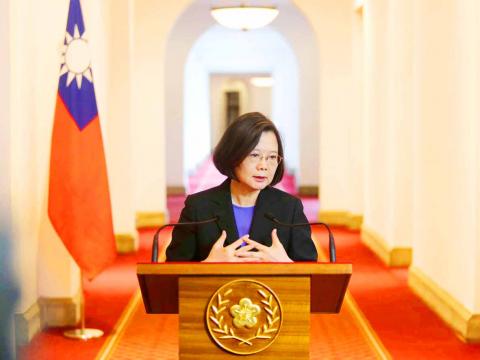President Tsai Ing-wen (蔡英文) yesterday dismissed speculation that Premier William Lai (賴清德) would step down next month, saying that she believes that they would remain “close associates.”
Tsai made the remarks at a news conference held in a hallway of the Presidential Office.
While it was the first time the president addressed the media at the location, she said more “hallway chats” would be held.

Photo: CNA
Over the past several weeks, the Executive Yuan’s most important job has been to review the government’s work, and Lai and his team have been doing that, she said.
She has frequently met with Lai to discuss their views and feelings, and both agreed that “the current priority is to review the government’s work,” she said.
The two have been “close associates” for more than a year and she believes “it will remain that way,” Tsai said.
Lai had offered to resign following the Democratic Progressive Party’s (DPP) losses in the Nov. 24 elections, but was persuaded by the president to remain in his post.
The resignation rumor began after DPP Legislator Tuan Yi-kang (段宜康) said that the premier would step down after completing general budget bills for next year.
The DPP lost seven cities and counties in the elections, including Kaohsiung, which the party had governed for the past 20 years.
The DPP won 13 cities and counties in the 2014 elections.
Lai and Presidential Office Secretary-General Chen Chu (陳菊) are “not the kind of people obsessed with status,” Tsai said, adding that they are people who “know when to be humble and take responsibility.”
“The three of us have good interactions,” she said.
While there has been speculation over whether the party would collaborate with independent Taipei Mayor Ko Wen-je (柯文哲), Tsai said that the party’s next challenge is to “garner the support of most of society.”
When the DPP was defeated in the 2008 elections, it made party members realize that infighting is not only unhelpful, but that it causes more problems, she said.
Following last month’s elections, DPP members have had similar or different opinions on why the party suffered massive losses, she said.
While some were more expressive, others have kept quiet, but all agree that solidarity should be prioritized, she said, adding that she is confident that the party can reorganize and tackle more challenges.
“In the face of difficulties, it is most important to stay united,” Tsai said.
Additional reporting by CNA

CALL FOR SUPPORT: President William Lai called on lawmakers across party lines to ensure the livelihood of Taiwanese and that national security is protected President William Lai (賴清德) yesterday called for bipartisan support for Taiwan’s investment in self-defense capabilities at the christening and launch of two coast guard vessels at CSBC Corp, Taiwan’s (台灣國際造船) shipyard in Kaohsiung. The Taipei (台北) is the fourth and final ship of the Chiayi-class offshore patrol vessels, and the Siraya (西拉雅) is the Coast Guard Administration’s (CGA) first-ever ocean patrol vessel, the government said. The Taipei is the fourth and final ship of the Chiayi-class offshore patrol vessels with a displacement of about 4,000 tonnes, Lai said. This ship class was ordered as a result of former president Tsai Ing-wen’s (蔡英文) 2018

‘SECRETS’: While saying China would not attack during his presidency, Donald Trump declined to say how Washington would respond if Beijing were to take military action US President Donald Trump said that China would not take military action against Taiwan while he is president, as the Chinese leaders “know the consequences.” Trump made the statement during an interview on CBS’ 60 Minutes program that aired on Sunday, a few days after his meeting with Chinese President Xi Jinping (習近平) in South Korea. “He [Xi] has openly said, and his people have openly said at meetings, ‘we would never do anything while President Trump is president,’ because they know the consequences,” Trump said in the interview. However, he repeatedly declined to say exactly how Washington would respond in

WARFARE: All sectors of society should recognize, unite, and collectively resist and condemn Beijing’s cross-border suppression, MAC Minister Chiu Chui-cheng said The number of Taiwanese detained because of legal affairs by Chinese authorities has tripled this year, as Beijing intensified its intimidation and division of Taiwanese by combining lawfare and cognitive warfare, the Mainland Affairs Council (MAC) said yesterday. MAC Minister Chiu Chui-cheng (邱垂正) made the statement in response to questions by Democratic Progressive Party (DPP) Legislator Puma Shen (沈柏洋) about the government’s response to counter Chinese public opinion warfare, lawfare and psychological warfare. Shen said he is also being investigated by China for promoting “Taiwanese independence.” He was referring to a report published on Tuesday last week by China’s state-run Xinhua news agency,

‘ADDITIONAL CONDITION’: Taiwan will work with like-minded countries to protect its right to participate in next year’s meeting, the foreign ministry said The US will “continue to press China for security arrangements and protocols that safeguard all participants when attending APEC meetings in China,” a US Department of State spokesperson said yesterday, after Beijing suggested that members must adhere to its “one China principle” to participate. “The United States insists on the full and equal participation of all APEC member economies — including Taiwan — consistent with APEC’s guidelines, rules and established practice, as affirmed by China in its offer to host in 2026,” the unnamed spokesperson said in response to media queries about China putting a “one China” principle condition on Taiwan’s